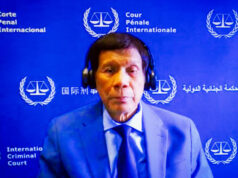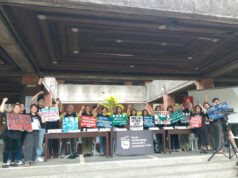Senate says anti-terror bill ‘good as passed’ but House still deliberating
THE proposed law that expands the definition of terrorist acts is as good as passed after President Rodrigo R. Duterte certified the bill as an urgent measure, senators said on Tuesday.
The bill was approved by the Senate in February and is pending second reading at the House of Representatives.
“It’s as good as passed,” Senate President Vicente C. Sotto III told reporters over phone message on Tuesday.
The President’s certification will allow the House to dispense with the three-day interval in passing bills on second and third reading.
House representatives, however, were still steeped in plenary debate as of Tuesday evening for the second reading.
Congress’ first regular session closes on June 3. It will reopen on July 27, with the President delivering his 5th State of the Nation Address.
“Once the House of Representatives approves the adopted Senate version of the Anti-Terror bill on third and final reading, they will transmit it to us for enrollment and subsequent submission to the President,” Senator Panfilo M. Lacson said in a statement.
OPPOSITION
Albay Rep. Edcel C. Lagman warned that the expanded definition of terrorism encompasses perceived and suspected terror acts, which may include political dissent.
“Redefining the crime of terrorism by removing the inculpatory purpose of terrorism ‘to coerce the government to give in to an unlawful demand,’ thus making prosecution and conviction easier,” he said in a statement.
The proposed law will also allow the military to access data and information as well as intercept private communications of suspects under surveillance and detain them for 14 days without warrant.
The National Union of Peoples’ Lawyers also reiterated its opposition and called on lawmakers to stop the bill’s passage saying it will serve only the “climate of impunity,” validate attacks against activists and ordinary citizens.
In a statement, the lawyers’ group said the bill “unduly expands” the definition of terrorism,” and potentially criminalizes as “terrorist” the exercises of free speech.
“This proposed law, we pointed out, would undermine our democracy and either threaten, restrain or discourage the people’s right to organize, criticize the government, protest and demand for a redress of their grievances,” the group said.
“The bill, should it become law, will only serve to worsen the climate of impunity that has made the Philippines fertile ground for extra-judicial killings, illegal arrests, and crackdowns against activists and progressive organizations and even ordinary citizens,” they said.
The Concerned Lawyers for Civil Liberties also said the bill will be used by the administration “to eliminate dissent and opposition, at whatever cost and manner,” adding that it contains unconstitutional provisions.
Mr. Lacson, on the other hand, said the bill has enough safeguards for human rights.
The bill, as passed by the Senate, expands the coverage of terror acts to include attacks that cause death or serious injury, extensive damage to property and manufacture, possession, acquisition, transport and supply of weapons or explosives.
The law only penalizes the commission of the actual terrorism, conspiracy to commit terrorism, being an accomplice and accessory to the crime.
The presidential palace also defended the bill saying it is “not draconian” and is patterned after legislation in other countries.
“Wala naman draconian na provision diyan, lahat po ng provision diyan ay ibinase rin natin sa mga batas na mga iba’t ibang bansa na mas epektibo po ang kanilang pagtrato dito sa mga terorista (There are no draconian provisions there, all the provisions there are based on laws in various countries with more effective ways of dealing with terrorists),” Palace Spokesperson Harry L. Roque said in a briefing on Tuesday.
He also said the administration won’t intervene with lawmakers on the bill’s passage.–Charmaine A. Tadalan, Genshen L. Espedido, Vann Marlo M. Villegas and Gillian M. Cortez



